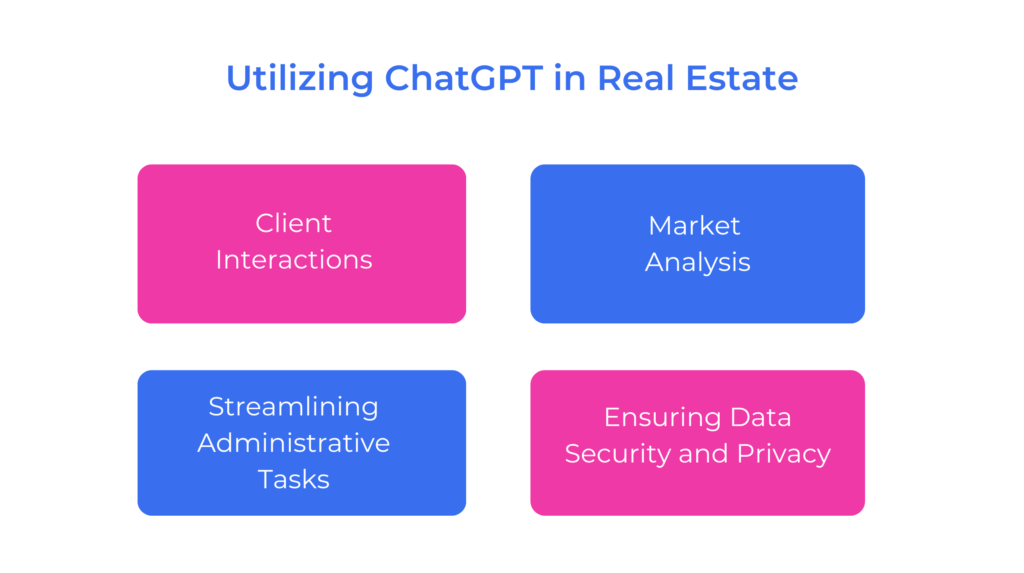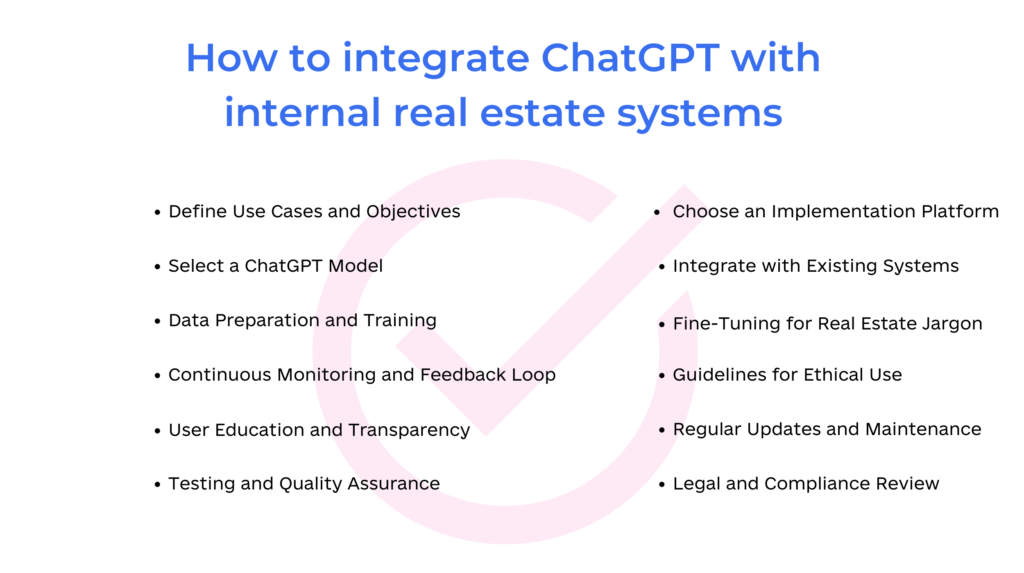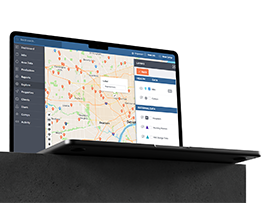ChatGPT is a conversational AI model that can interact with users in a natural way. ChatGPT can answer questions, provide information, generate content, and offer suggestions based on user input and feedback. ChatGPT is powered by generative AI, a branch of artificial intelligence that can create novel and realistic content based on patterns and structures learned from existing data, such as text, images, music, and more.
AI technology is changing how various industries do business by automating processes, improving efficiency, and enhancing customer experience. AI technology can also enable innovation, disruption, and transformation by creating new opportunities, challenges, and solutions. One of the industries that can benefit from AI technology is real estate, which involves buying, selling, renting, and managing properties.
This article explores how ChatGPT can benefit real estate professionals by providing examples of use cases, best practices, and success stories.
Understanding ChatGPT in Real Estate: How to Use ChatGPT for Real Estate
ChatGPT, powered by OpenAI, is an AI language model designed to generate human-like text based on the input it receives. It operates on a vast dataset of text from diverse sources, enabling it to understand and generate content on a wide range of topics.

ChatGPT is a powerful and versatile tool that can enhance the performance and satisfaction of real estate professionals and their clients. The generative AI tool can help real estate professionals improve their marketing, sales, and customer service by creating and delivering personalized and engaging content.
Using ChatGPT, real estate professionals can create engaging property descriptions. ChatGPT can also help real estate professionals learn and grow by offering insights, feedback, and education on market trends and customer preferences.
Unlike traditional chatbots, ChatGPT doesn’t rely on pre-programmed responses; instead, it generates responses dynamically based on the context provided.
AI technology can also help real estate professionals analyze market conditions, evaluate property values, identify investment opportunities, and facilitate property transactions faster, more accurately, and conveniently.
The Benefits of ChatGPT for Realtors
Integrating ChatGPT into various facets of the real estate industry can lead to more efficient operations, improved customer satisfaction, and a competitive edge in a dynamic market.

Leveraging ChatGPT in the real estate industry can provide several advantages beyond those mentioned earlier.
Here’s a detailed breakdown of the advantages we’ve highlighted:
1. Efficient Communication
ChatGPT can respond immediately to client inquiries, ensuring quick and efficient communication. The AI tool is particularly valuable in a fast-paced industry like real estate, where timely responses can make a significant difference.
ChatGPT can operate 24/7, offering round-the-clock support to potential buyers or renters. It ensures clients receive information conveniently, regardless of time zones or working hours.
2. Personalization
ChatGPT can analyze client preferences, past interactions, and specific requirements to provide highly personalized property recommendations. This personal touch enhances the client experience and increases the likelihood of successful transactions.
ChatGPT can remember individual client preferences by maintaining user profiles and histories, allowing for a more personalized and continuous conversation across interactions.
3. Lead Generation
ChatGPT can engage with website visitors, initiate conversations, and capture basic information to qualify leads. It facilitates the identification of potential clients and directs them to the appropriate resources or team members.
Through ongoing interactions, ChatGPT can nurture leads by providing relevant information, answering questions, and guiding potential clients through the initial stages of the buying or renting process.
4. Content Creation
ChatGPT can generate compelling and unique property descriptions, highlighting key features and selling points. The AI tool streamlines the creation of engaging listings for various real estate platforms.
ChatGPT can also assist in generating blog posts, social media updates, and other content to enhance the online presence of real estate agencies. The AI tool contributes to effective marketing and establishes thought leadership in the industry.
5. Automation and Workflow Optimization
ChatGPT can automate routine tasks such as appointment scheduling, property tour arrangements, and information dissemination. It allows real estate professionals to focus on more complex and high-value aspects of their work.
Integrating ChatGPT into existing CRM systems and workflows can optimize internal processes, improving efficiency in managing client interactions, appointments, and follow-ups.
6. Market Insights
ChatGPT can analyze market trends, pricing data, and customer feedback to provide insights into the current real estate landscape. This information can be invaluable for strategic decision-making and market competitiveness.
7. Legal and Compliance Assistance
ChatGPT can provide clients with basic information regarding the legal aspects of real estate transactions, ensuring they are well-informed about the legal implications of their decisions.
Additionally, ChatGPT can assist in ensuring that all communications and transactions adhere to legal and regulatory requirements, reducing the risk of non-compliance.
How to Use ChatGPT in Real Estate: The Complete Guide
With advancements in technology, artificial intelligence (AI) tools like ChatGPT have become invaluable assets for professionals looking to streamline their processes and enhance their productivity.
Implementing ChatGPT in real estate workflows involves several practical steps, from integrating existing systems to training the model for industry-specific nuances.

1. Client Interactions
One of the primary ways real estate professionals can leverage ChatGPT is in client interactions. Whether it’s responding to inquiries, scheduling appointments, or providing property information, ChatGPT can handle these tasks efficiently, freeing up your time to focus on high-priority activities.
When communicating with clients through ChatGPT, it’s essential to ensure clarity and accuracy in your messages. While ChatGPT is adept at understanding natural language, providing clear and concise input can help generate more relevant responses. Additionally, monitoring the conversations and stepping in when necessary ensures a seamless client experience.
2. Market Analysis
In the dynamic real estate market, access to timely and accurate data is crucial for making informed decisions. ChatGPT can assist real estate professionals in conducting market analysis by synthesizing information from various sources and providing insights on market trends, property values, and investment opportunities.
By asking ChatGPT targeted questions about specific markets or properties, you can quickly gather relevant data to inform your decision-making process. Whether you’re evaluating potential investment opportunities or advising clients on market conditions, ChatGPT can provide valuable insights to support your analysis.
3. Streamlining Administrative Tasks
ChatGPT can also streamline various administrative tasks associated with real estate transactions. From drafting contracts and agreements to managing paperwork and documentation, ChatGPT can assist with a range of administrative duties, saving you time and effort.
By integrating ChatGPT into your workflow, you can automate repetitive tasks and focus on activities that require human expertise and judgment. Whether you’re a real estate agent, broker, or investor, leveraging ChatGPT’s capabilities can help you optimize your productivity and efficiency.
4. Ensuring Data Security and Privacy
While ChatGPT offers numerous benefits for real estate professionals, it’s essential to prioritize data security and privacy when using AI tools. When interacting with clients or handling sensitive information, ensure that you comply with relevant regulations and implement robust security measures to protect data confidentiality.
Additionally, be mindful of the limitations of AI technology and avoid relying solely on ChatGPT for critical decision-making processes. While ChatGPT can provide valuable insights and assistance, human judgment remains indispensable in complex real estate transactions.
Here’s a step-by-step guide for integrating ChatGPT with internal real estate systems:

1. Define Use Cases and Objectives
- Identify specific use cases for ChatGPT, such as lead generation, client engagement, or content creation.
- Clearly define the objectives, such as improving customer service, streamlining communication, or enhancing marketing efforts.
2. Choose an Implementation Platform
- Decide whether to implement ChatGPT on a website, through a dedicated chat platform, or as part of a mobile app.
- Choose a platform that aligns with the preferences of your target audience and integrates seamlessly with existing systems.
3. Select a ChatGPT Model
- Choose the appropriate ChatGPT model based on your requirements and available resources.
- Consider factors like response time, customization capabilities, and cost when selecting a model.
4. Integrate with Existing Systems
- Develop APIs or use pre-built integrations to connect ChatGPT with existing Customer Relationship Management (CRM) systems, property databases, and scheduling tools.
- Ensure bidirectional communication to update CRM records based on interactions with ChatGPT.
5. Data Preparation and Training
- Curate a dataset with examples of real estate-specific queries, responses, and scenarios.
- Annotate the dataset with relevant information, such as property details, client preferences, and industry jargon.
- Train the ChatGPT model using the curated dataset to improve its understanding of real estate-specific contexts.
6. Fine-Tuning for Real Estate Jargon
- Fine-tune the ChatGPT model using domain-specific data to make it more proficient in understanding real estate jargon.
- Incorporate property-related terms, legal terminology, and industry-specific nuances into the training data.
7. Continuous Monitoring and Feedback Loop
- Regularly monitor ChatGPT interactions to identify areas for improvement.
- Establish a feedback loop where real estate professionals provide input to enhance the model’s performance over time.
8. Guidelines for Ethical Use
- Develop guidelines and protocols for ChatGPT interactions to ensure ethical behavior and compliance with industry regulations.
- Implement safeguards to handle sensitive information securely and prioritize user privacy.
Ethical AI 101: Understanding the Ethical AI Concepts
9. User Education and Transparency
- Educate users (both real estate professionals and clients) about the capabilities and limitations of ChatGPT.
- Be transparent about using AI in interactions and clarify that human assistance is available.
10. Regular Updates and Maintenance
- Stay informed about updates to ChatGPT models and tools and incorporate the latest improvements into your implementation.
- Perform regular maintenance to address any issues, update training data, and ensure optimal performance.
11. Testing and Quality Assurance
- Conduct extensive testing to identify and rectify potential issues with ChatGPT’s understanding and responses.
- Implement quality assurance processes to maintain high standards in client interactions.
12. Legal and Compliance Review
- Consult legal professionals to ensure ChatGPT interactions comply with real estate laws and regulations.
- Regularly review and update ChatGPT’s knowledge base to reflect any changes in legal requirements.
By following these steps, real estate professionals can integrate ChatGPT seamlessly into their workflows, leveraging its capabilities to enhance communication, provide personalized services, and streamline various aspects of the real estate industry.
Clever Ways to Use ChatGPT for Real Estate Agents in 2024
In the dynamic world of real estate, where time is of the essence and personalized service is paramount, ChatGPT has emerged as a game-changer for real estate agents and agencies. This powerful AI tool is transforming various aspects of the industry, offering innovative solutions that streamline workflows and enhance client experiences.
Here are some specific use cases and scenarios where ChatGPT proves to be exceptionally beneficial for real estate professionals:
1. Instant Property Information
ChatGPT provides immediate responses, offering details about property features, pricing, and availability, ensuring a seamless and quick initial interaction.
A potential buyer visits a real estate website interested in a property. Instead of waiting for an agent’s availability, they can engage with ChatGPT for instant property information.
By integrating with scheduling systems, ChatGPT automates setting up property viewings, eliminating delays and improving overall efficiency. For instance, a client expresses interest in viewing a property but struggles to find a suitable time. ChatGPT steps in to facilitate the scheduling process.
2. Client Engagement and Follow-up
Engaging with clients and following up on leads are crucial aspects of real estate transactions. ChatGPT offers a streamlined solution to ensure effective client engagement and follow-up processes.
ChatGPT can automate follow-ups, ensuring that leads are nurtured effectively. This automation helps maintain ongoing communication with potential clients, ultimately increasing the likelihood of converting interested parties into satisfied clients.
For instance, suppose a client expresses interest in a property but doesn’t proceed with the purchase immediately. In such cases, ChatGPT can step in and send automated follow-up messages. These messages can be personalized based on the client’s previous interactions, addressing any concerns they may have expressed or inquiring about additional requirements.
Automated follow-ups not only save time for real estate professionals but also demonstrate responsiveness and commitment to potential clients. By leveraging ChatGPT for client engagement and follow-up, real estate agents can ensure that no lead slips through the cracks and that each potential client receives the attention they deserve.
3. Crafting Compelling Property Listings
Crafting compelling property listings is essential to attract potential buyers and stand out from the crowd. ChatGPT offers valuable assistance in generating captivating and detailed property descriptions that enhance the marketing and visibility of listed properties.
AI-generated content can help real estate agents create engaging property listings that resonate with prospective buyers. ChatGPT can analyze property details and market trends to generate descriptive narratives that highlight the unique features and selling points of each property.
For example, ChatGPT can craft vivid descriptions that evoke emotions and paint a picture of the lifestyle potential buyers could enjoy in the property. From highlighting architectural details to emphasizing the surrounding amenities and neighborhood attractions, ChatGPT can tailor the listing content to appeal to the target audience.
Moreover, ChatGPT’s ability to generate content quickly and efficiently allows real estate agents to focus their time and energy on other aspects of their business, such as client interactions and property viewings. By leveraging ChatGPT to craft compelling property listings, real estate professionals can attract more qualified leads and expedite the sales process.
4. Personalized Property Recommendations
Leveraging machine learning, ChatGPT can analyze client data to provide personalized property recommendations, ensuring a more tailored and satisfying search experience.
For example, a potential buyer is uncertain about what type of property suits their needs. ChatGPT can engage the client in a conversation, gathering information about preferences, budget, and lifestyle.
5. Streamlining Market Research and Analysis
In addition to assisting with client engagement and property listings, ChatGPT can streamline market research and analysis for real estate professionals. By processing vast amounts of data and extracting valuable insights, ChatGPT enables agents to make informed decisions and stay ahead of market trends.
For instance, ChatGPT can analyze market trends, including property prices, demand-supply dynamics, and emerging neighborhoods. Real estate professionals can leverage this information to advise clients on investment opportunities, pricing strategies, and market conditions.
Moreover, ChatGPT can assist in conducting comparative market analyses (CMAs) by analyzing comparable properties and generating comprehensive reports. By automating the data collection and analysis process, ChatGPT allows agents to focus on interpreting the results and providing valuable insights to their clients.
Furthermore, ChatGPT’s ability to process natural language queries makes it a valuable tool for answering client inquiries related to market trends and property values. Whether clients are seeking information about recent sales in a specific area or want to know about upcoming developments, ChatGPT can provide timely and accurate responses, enhancing the overall customer experience.
By leveraging ChatGPT for market research and analysis, real estate professionals can gain a competitive edge, make data-driven decisions, and provide enhanced services to their clients.
6. Other Innovative Uses for Realtors
Scenario 1: ChatGPT is integrated into a real estate agency’s website to provide an interactive and intelligent property search experience.
Use Case: Users can ask natural language queries, such as “Show me homes with a pool under $500,000,” receiving instant and accurate results.
Scenario 2: ChatGPT is employed for market research, analyzing data trends, and providing insights into emerging real estate opportunities.
Use Case: Realtors can make informed decisions based on up-to-date market analyses, ensuring a competitive edge in the industry.
Scenario 3: ChatGPT is used in virtual property tours, guiding clients through a property via a conversational interface.
Use Case: Virtual tours become more engaging and informative, offering a personalized experience even without a physical agent.
Check our 3D room reconstruction app solution
Wrapping Up
The application of ChatGPT in real estate introduces transformative benefits, from instant information delivery to personalized client interactions. While ChatGPT can be a powerful tool, it is important to remember that it does not replace human expertise and creativity.
ChatGPT can help real estate professionals supplement their existing skills and knowledge, not replace them. Real estate agencies should explore and adopt AI, ensuring a future where technology enhances, rather than replaces, the human touch in real estate practices. Real estate professionals can unlock the potential of AI to revolutionize agency’s operations.
Achievion can help you build ROI-positive AI solutions, that increase lead engagement, help analyze client data for tailored property recommendations, streamline market research and more. Ready to boost your business efficiency using a conversational AI? Drop us a line!
Read also:
Generative AI for Interior Design: Benefits, Use Cases, and Trends
Enhancing Real Estate Investment Analysis Through AI: A Comprehensive Guide
Understanding the Legal Aspects Associated with AI Projects
Maximizing Value with Machine Learning: A Guide for Decision-Makers



![How to Use ChatGPT for Real Estate [2024 Guide]](https://achievion.com/wp-content/uploads/2024/03/How-to-Use-ChatGPT-for-Real-Estate-2.png)





